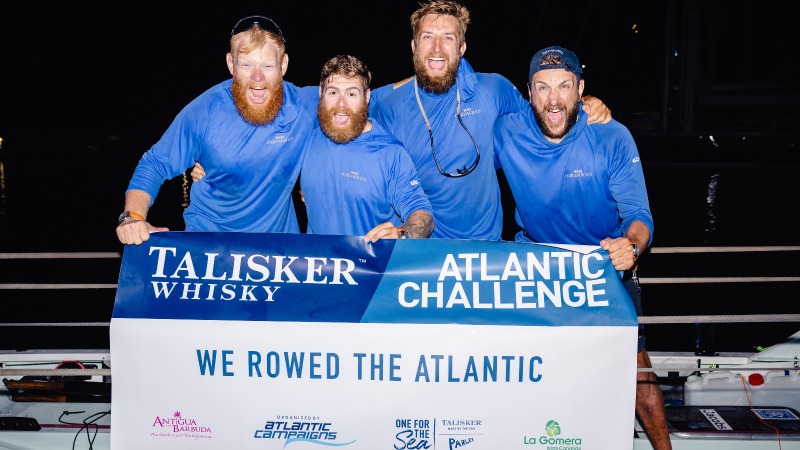Oxford Brookes University supports Royal Navy submariners’ epic 3,000-mile ocean rowing challenge

Royal Navy submariners used hi-tech kit from Oxford Brookes University to monitor their physical performance during the gruelling 3,000-mile Talisker Whisky Atlantic Rowing Challenge.
Royal Navy submariners used hi-tech kit from Oxford Brookes University to monitor their physical performance during the gruelling 3,000-mile Talisker Whisky Atlantic Rowing Challenge.
The HMS Oardacious team set off on 12 December and took 35 days and 17 hours to complete the challenge, pushing themselves to their mental and physical limits and becoming the fastest ever serving military team to row across the Atlantic.
Oxford Brookes University provided the team with cutting-edge wearable technology that measures how the body reacts to the demands put on it. The technology is used in sports science as well as cardiology, neuropsychology, rehabilitation and occupational health. The four rowers also used specialist watches to measure their bodies’ responses to the extreme conditions.
Dr Peter Wright, Programme Lead for Sport and Coaching Sciences at Oxford Brookes, said: “The technology gives us medical quality data on the heart’s rhythm and electrical activity, breathing, movement and sleep which allows us to learn about how the human body responds to operating in these extreme environments in terms of both stress and recovery. It also gives the rowers and their coaches the opportunity to steer their preparation and training specifically towards these demands.
“An extreme event of this kind is a rare opportunity to produce very accurate and in-depth data which will inform our research and help the performance of people taking part in sport or occupations operating in extreme environments.”
The gruelling challenge saw the team rowing for two hours at a time on rotation. Battling 30 feet high waves, there was little time for rest or sleep. The team also had to try and eat up to 7,000 calories a day to recoup the massive amounts of energy they were burning.
Lieutenant Commander Mitchell-Heggs, the Royal Navy’s Submarine Service Human Performance Lead, and one of the crew on HMS Oardacious, said the team approached Oxford Brookes as they were keen to drive their performance by making use of the university’s cutting edge technology and sports science.
He said: “Our team members are high performers and pushed themselves as hard as they could. We were put in touch with the sports department at Oxford Brookes through a mutual acquaintance, Prof Martin Jones, who is an expert in human performance, recovery and sports psychology.
“I’m looking forward to wading through the data and seeing what my body was doing in comparison to the others.”
The other members of the crew were Lieutenant Commander Callum Fraser, Petty Officer Jon Norfolk and Lieutenant Tom Hutchinson.
The Royal Navy and Oxford Brookes plan to continue to work together as the Navy hopes to enter the challenge again in 2024 with an all-women team.
As well as completing the challenge, the four-strong team raised hundreds of thousands of pounds for The Submarine Family - a charity that aims to support the wellbeing of submariners and their families. They also launched an outreach programme for schools and youth groups.
